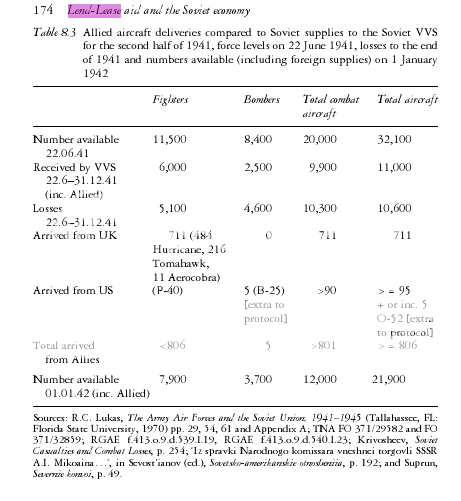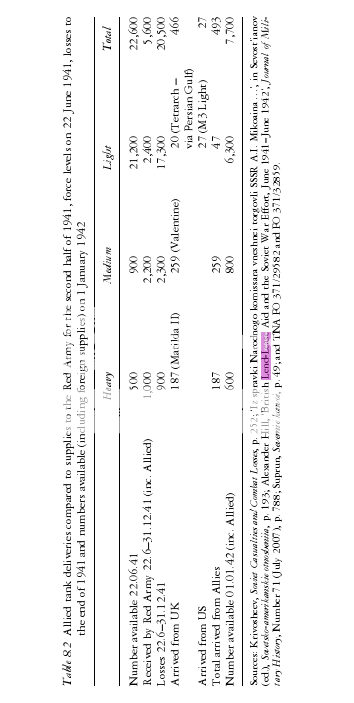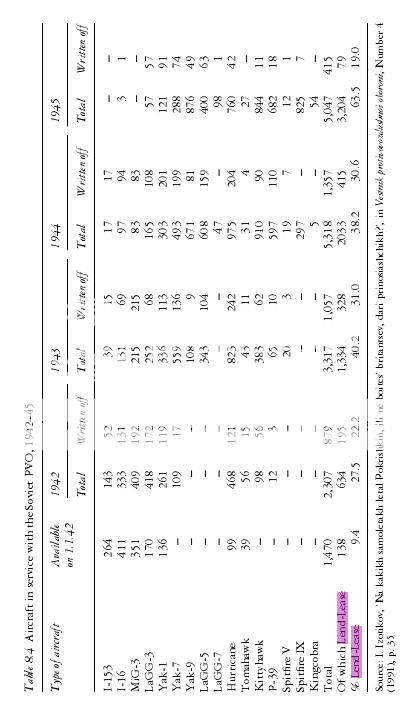
Originally Posted by
pp. 172-4
As discussed briefly in Chapter 4 with reference to tanks, when Allied, in particular British, deliveries of key weapons systems for the war as a whole are compared to Soviet production for the same period they can understandably be viewed as being of little significance. However, as shown, during the Battle for Moscow in late 1941 the Soviet resource situation was so dire that relatively small inputs of tanks were of some significance. This situation would continue well into 1942. Tables 8.2 and 8.3 show tanks and aircraft delivered to the Soviet Union for 1941, with Soviet production figures for the same period, as well as force levels as of 22 June 1941, losses for the first six months of the war, and numbers available (including foreign supplies) on 1 January 1942. A steady stream of British-supplied tanks continued to be provided to Soviet units during the spring and summer of 1942. From 10 May 1942 British tanks were being sent to reinforce the Briansk and Kalinin Fronts and South-Western napravlenie, with the South-Western napravlenie to receive 90 Matildas and 70 Valentines during May 1942. 13 According to Suprun, immediately prior to July 1942 and therefore at the end of the First Moscow Protocol period, the Red Army had 13,500 tanks in service, of which 2,200 or 16 per cent were imported, and of which over 50 per cent were British. 14 However, mechanical problems, in part due to Soviet unfamiliarity with this new, foreign equipment, kept in the region of 50 per cent of imported tanks out of service at any one time up to the end of 1942. Soviet sources did, however, note the general relative reliability of Leyland engines of Matildas compared to Soviet models. 15 Whilst by late 1942 Soviet production lessened the significance of British tank supplies, aircraft deliveries, the importance of which arguably exceeded tanks during the First Moscow Protocol period, remained significant into 1943. Soviet combat aircraft production from the end of June 1941 to the end of June 1942 was in the region of the 16,468 aircraft given by Harrison. 16 By the end of June 1942 the UK had delivered 1,323 fighter aircraft, or about 8 per cent of Soviet production from the start of the war. 17 Given that Soviet combat-aircraft losses for this period at best approached domestic supply, and were particularly severe for the first six months of the war, British deliveries alone were of some significance, especially when the particularly high Soviet losses of the first weeks of the war, depleting prewar stocks, are taken into account. As early as 12 October 1941, 126th Fighter Air Regiment of the PVO was operating with Tomahawks, the first Soviet unit to be equipped with this aircraft. 18 PVO use of Allied aircraft during 1941– 45 is indicated in Table 8.4. As with much Western equipment, the process of training, conducted by 27th Reserve Air Regiment that was formed in August 1941 for the task of conversion to Allied aircraft, was hampered by a lack of technical documentation, particularly in Russian. 19 Tomahawks (P-40s) also served in late 1941 in defence of the ‘Doroga zhizni’ or ‘Road of Life’ across the ice of Lake Ladoga to the besieged Leningrad.








 Reply With Quote
Reply With Quote


















 ]. What the hell, it’ll give you guys something else besides world politics to yak about….
]. What the hell, it’ll give you guys something else besides world politics to yak about….

Bookmarks